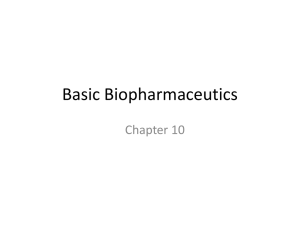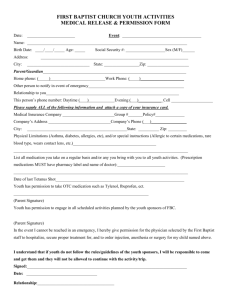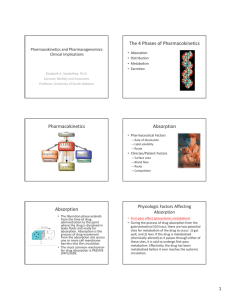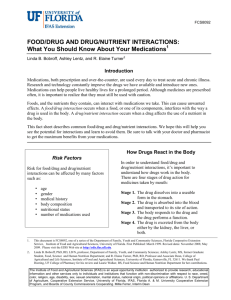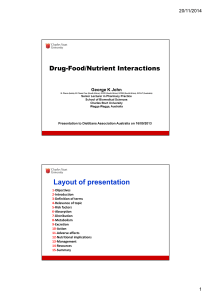G-0865 Drug-Nutrient Interactions, What and When
advertisement
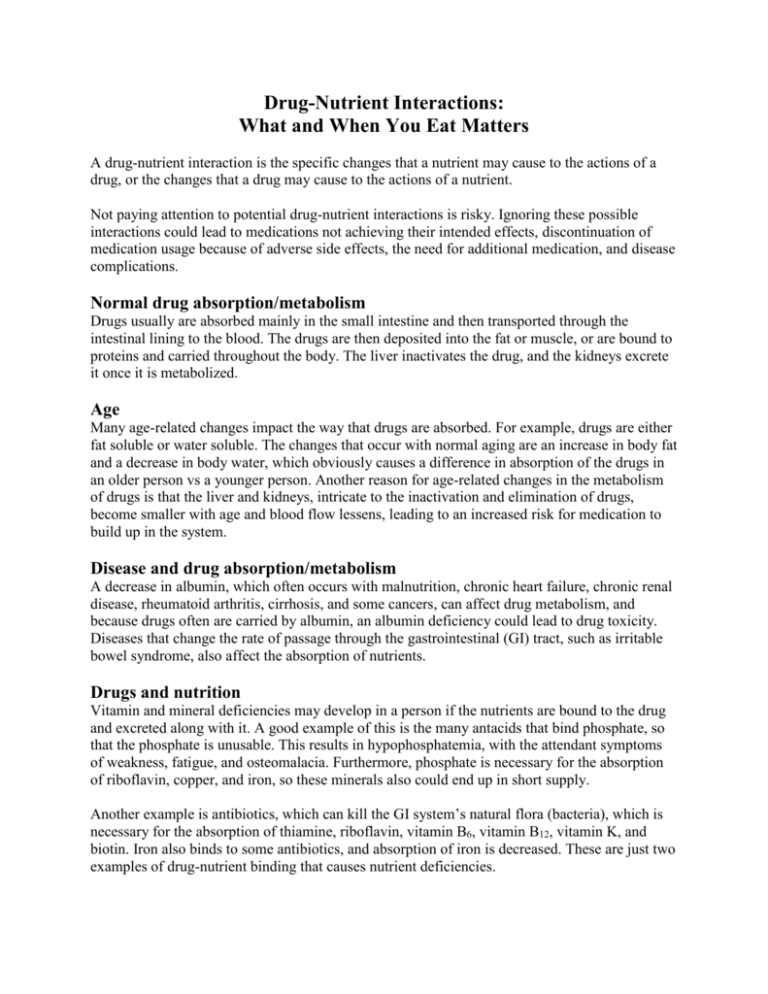
Drug-Nutrient Interactions: What and When You Eat Matters A drug-nutrient interaction is the specific changes that a nutrient may cause to the actions of a drug, or the changes that a drug may cause to the actions of a nutrient. Not paying attention to potential drug-nutrient interactions is risky. Ignoring these possible interactions could lead to medications not achieving their intended effects, discontinuation of medication usage because of adverse side effects, the need for additional medication, and disease complications. Normal drug absorption/metabolism Drugs usually are absorbed mainly in the small intestine and then transported through the intestinal lining to the blood. The drugs are then deposited into the fat or muscle, or are bound to proteins and carried throughout the body. The liver inactivates the drug, and the kidneys excrete it once it is metabolized. Age Many age-related changes impact the way that drugs are absorbed. For example, drugs are either fat soluble or water soluble. The changes that occur with normal aging are an increase in body fat and a decrease in body water, which obviously causes a difference in absorption of the drugs in an older person vs a younger person. Another reason for age-related changes in the metabolism of drugs is that the liver and kidneys, intricate to the inactivation and elimination of drugs, become smaller with age and blood flow lessens, leading to an increased risk for medication to build up in the system. Disease and drug absorption/metabolism A decrease in albumin, which often occurs with malnutrition, chronic heart failure, chronic renal disease, rheumatoid arthritis, cirrhosis, and some cancers, can affect drug metabolism, and because drugs often are carried by albumin, an albumin deficiency could lead to drug toxicity. Diseases that change the rate of passage through the gastrointestinal (GI) tract, such as irritable bowel syndrome, also affect the absorption of nutrients. Drugs and nutrition Vitamin and mineral deficiencies may develop in a person if the nutrients are bound to the drug and excreted along with it. A good example of this is the many antacids that bind phosphate, so that the phosphate is unusable. This results in hypophosphatemia, with the attendant symptoms of weakness, fatigue, and osteomalacia. Furthermore, phosphate is necessary for the absorption of riboflavin, copper, and iron, so these minerals also could end up in short supply. Another example is antibiotics, which can kill the GI system’s natural flora (bacteria), which is necessary for the absorption of thiamine, riboflavin, vitamin B6, vitamin B12, vitamin K, and biotin. Iron also binds to some antibiotics, and absorption of iron is decreased. These are just two examples of drug-nutrient binding that causes nutrient deficiencies. Drugs that change the functioning of the GI tract will naturally affect the absorption of nutrients. Damage to the lining of the GI tract, which normally contains enzymes necessary for food digestion and supplies transporters to carry nutrients into the blood, can occur with certain drugs, such as aspirin. Some drugs cause decreased usage of vitamins and/or minerals by changing the acid content of the stomach, especially necessary for absorption of vitamin B12, and other conditions necessary for proper absorption. The speed of nutrients as they move through the GI tract may cause some deficiencies to develop. For example, laxatives speed up the rate of elimination, moving fat-soluble vitamins (vitamins A, D, E, and K) too quickly through the system for absorption. Laxative usage also can cause serious electrolyte imbalances. Individuals using laxatives should do so only under the care of a physician. Drug side effects Some drugs cause hyperphagia (increased hunger) or hypophagia (decreased hunger), which can lead to body weight changes. Other drugs cause changes in taste (ie, imparting a metallic flavor to any food eaten). The following can occur with some medications and can alter a person’s nutritional well-being: Changes to smell Dry mouth Mouth pain Difficulty swallowing Nausea Vomiting Shaking Agitation Dizziness Sleepiness Light-headedness Confusion Unusual cravings Impact of nutrition Non-nutrient compounds in food can impact drug metabolism. For example, compounds in cabbage, broccoli, and cauliflower can increase the rate of medication metabolism. Grapefruit juice inhibits the intestinal enzyme that breaks down many medications and may lead to drug toxicity, regardless of when the grapefruit juice is ingested. Some studies have demonstrated a similar effect exerted by Seville oranges (often used in marmalade), pomelos, and tangelos. Side effects associated with the use of hypnotics, antidepressants, and antianxiety drugs are sometimes exaggerated by the consumption of alcohol. Alcohol also can have strong effects on people taking a variety of other drugs, including beta-blockers and diabetes medications. Alcohol use is not recommended when taking any medication that may lead to liver toxicity, such as Tylenol®. Caffeine can interact with medications to increase the stimulant effects of caffeine, often by reducing excretion of the caffeine. You should not take some medications, particularly antibiotics, with foods containing calcium or iron, because these nutrients decrease the absorption of these medications. Sometimes, the basic components of a diet can alter drug metabolism. For example, the bronchodilator theophylline requires a high-carbohydrate, low-protein diet for optimal use by the body. A high-fiber diet can inhibit the absorption of digoxin and tricyclic antidepressants. When to take drugs It is important to take drugs at the recommended times. Sometimes drug absorption is reduced, delayed, or increased by the presence of food. Most drugs are absorbed more quickly on an empty stomach, which is sometimes good and sometimes not. Some drugs need exposure to stomach acid for a longer period of time to break down properly. Patients usually are advised to take these medications with food, which holds the medication in the stomach and exposes it to acid for longer. Acidic foods or beverages are not recommended when taking some medications, because the increase in stomach acid may interfere with drug absorption. If you are to take a medication on an empty stomach, you should avoid eating 1 hour before taking the medication and 2 hours after taking it. References and recommended readings Pronsky ZM, Crowe JP. Food-drug interactions. In: Mahan LK, Escott-Stump S, Raymond JL. Krause’s Food and the Nutrition Care Process. 13th ed. St Louis, MO: Elsevier Saunders; 2012:209-228. Santos CA, Boullata JI. An approach to evaluating drug-nutrient interactions. Pharmacotherapy. 2005;25(12):1789-1800. http://www.medscape.com/viewarticle/518759_1. Accessed March 21, 2014. Review Date 3/14 G-0865




